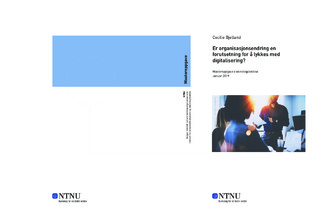| dc.description.abstract | Digitalisation is a highly relevant issue for entities within both private and public sector. Appropriate methods and tools have increasingly been subject for discussions where there seems to be a change from primarily technology focused issues to organisational approaches. The relevance of organisational issues is subject for the research in this study based on the question:
«Is organisational change a precondition for success in larger digitalisation projects?”
The empirical data is geographically limited as relevant entities are all located in the Nordic countries. This in contrast to the theoretical studies where international entities form the basis for most of the present research. Depending on differences in the conditions for cooperation and organisational development the experience may deviate, e.g. cooperation under the “Nordic model”.
The study is based on the experience by the following six Norwegian and one Swedish entities; Advokatfirma Thommessen AS, Oslo kommune, Helsingborg kommune, Helse Vest IKT AS, DigitalNorway Toppindustrisenteret AS, Lyse AS og Kongsberg Digital AS.
What appeared as a relatively simple question turned out to be a comprehensive and complex issue it is difficult to divide between digitalisation projects and long-term transformation work. However, the study determines that by separating «organizational change» into nine elements it is possible to analyse the casual connection between the single element and projects.
The conclusion of the study is that organisational change is a pre-condition in order to succeed in large digitalisation projects. Digitalisation projects are not limited to technology issues as they are influenced by the organisation and external partners as customers/citizens or marked. All elements have the required casual connection with a particular strong link with those elements involving humans as
«leadership» and «employees». Whether this is due to the experience under the “Nordic model” is raised as a question, though not concluded.
Furthermore, the study reveals that organisations work individually with the issues based on a «best practise and best fit». There are, however, some common elements as focus on customers interest, the importance of clear and long-term leadership and superior strategies that includes digitalisation. Systematic differences between private and public sector are not determined. In general, and regardless of sector there is a wide variation in the entities organisational approach - though with a tendency of increased use of network.
Finally, there are several similarities between digitalisation and innovation issues. Models and methods for innovation may therefore be relevant also for digitalisation activities,
e.g. McGraths eight steps for innovation. | nb_NO |
